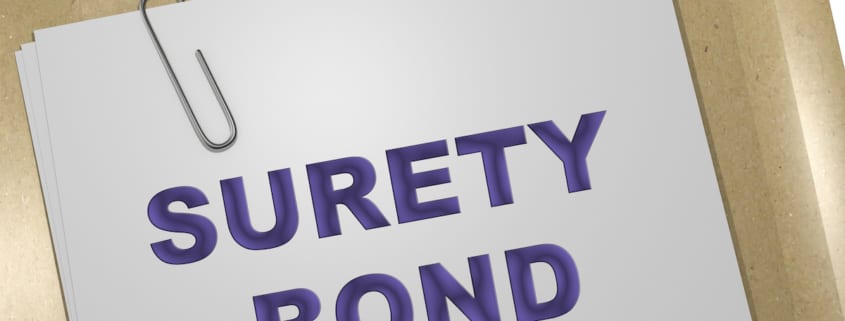Surety Bonds for Small Businesses

Surety bonds are essential for small businesses hoping to do business with federal and state governments. They’re also common in the worlds of construction and finance. The point of surety bonds is to guarantee a small business completes the job they’re contracted to perform, and to protect the customer of a transaction.
For instance, let’s imagine you own a small paving company. You win a bid to re-pave all the parking lots at a nearby state university. The state will require you to buy a surety bond before you start work. This way, if your small business disappears overnight midway through the job, the state will be repaid their investment.
Today we’ll cover everything you need to know about surety bonds, like:
- Different types of surety bonds
- The costs associated with surety bonds
- SBA bonds
- The difference between licensed, bonded and insured organizations
But before we get into any of that, let’s answer the most common question we get asked about surety bonds for small businesses:
“Does My Business Need to be Bonded?”
Generally, no. If you’re not in the construction sector, and you aren’t winning bids to work for the US government, you probably don’t need a surety bond. The average retailer, restaurant, website designer or photographer doesn’t need a surety bond to operate.
But a website developer implementing a website for a bank, a landscaping company working on government land, or any construction company will need them.
Who is Involved?
There are three parties involved in the surety bond agreement:
- The principal is the small business seeking a surety bond.
- The obligee is the company / organization requiring a contractor to be bonded.
- The surety is the insurance company guaranteeing the bond.
If the principal fails to complete the job, the surety will pay back the obligee.
| The Principal | The Obligee | The Surety |
| · A small business seeking a surety bond
· A construction company · A business that may be dealing with sensitive information |
· US federal or state governments seeking contractors
· Prime contractors seeking aid from sub-contractors · Financial institutions |
· The bond provider, often an insurance company |
Now, let’s think about the different types of surety bonds.
Different Types of Surety Bonds
There are several types of surety bonds. Common ones include:
- Contract bonds: A contract surety bond ensures the business owner will meet all the terms of the agreement and perform the work laid out in the contract.
- Fidelity bonds: Small business owners use these bonds to protect the business from a financial loss. They can protect against loss of a client’s money, for instance, or against a financial loss caused by an employee who commits fraud.
- Business service bond: If your small business works in the financial world, and there may be an opportunity for your employees to commit fraud (like a website design company building a database for a bank), a business service surety bond will protect your customers.
There are other miscellaneous bonds too, like mortgage broker bonds, gym / health spa bonds, real estate agent bonds, and fuel tax bonds, a.k.a. “IFTA.”
Surety bonds are sold by insurance agents that specialize in them, insurance companies, and they’re available online too. The process is like buying insurance. You’ll need to fill out an application, and it will go through an underwriting process. If you need a surety bond insurance quote, click here.
Bonds also exist in the world of private finance, and while they don’t apply directly to the concept of surety bonds for small businesses, you should know they exist.
How Much do Surety Bonds for Small Business Cost?
That depends on the size of the bond and your small business credit. Almost always, the price you pay for a surety bond will be based on your credit. A great price would be 1% of the bond – or $1,000 for every $100,000 of coverage. If you have excellent credit, you can expect to pay somewhere between 1% and 3% of the bond.
Unfortunately, not every small business has terrific credit. It can be challenging for young businesses who have a limited credit history to afford the bonds they need to tackle government jobs.
The US Small Business Administration (SBA) can help small businesses with less-than-perfect credit find bonds they need to work directly for the federal government, or as a subcontractor.
SBA Bonds
The US government encourages prime contractors to work with small businesses as subcontractors. The big players in the defense industry, companies like Lockheed-Martin and Boeing for instance, are required to spend many millions if not billions of dollars every year with small businesses.
- A small business that has nothing to do with defense industry might find itself seeking a surety bond to work for the prime contractor.
- A small janitorial business, for instance, might need to be bonded to clean field offices for a company like Boeing.
But if that small janitorial company doesn’t have great credit, they may struggle to find a surety bond. The SBA can help businesses in this position. Still, the prices for the bond might be high.
Small businesses with poor credit can expect to pay 10% for a surety bond (that’s $10,000 for every $100,000 on the surety bond.)
Finally, let’s talk about what it means to be “licensed, bonded and insured.”
What Does “Licensed, Bonded & Insured” Mean?
We hear these terms tossed around lightly sometimes, but they shouldn’t be!
- Licensing varies from one industry to the next. Here in the insurance world, for instance, licensed insurance agents must pass rigorous background checks, pass a state-mandated exam, pay for licensing, complete continuing education every year or two, and usually pass some sort of pre-licensing class, before getting fingerprinted – all at their own cost.
- Bonded means the company has a specific surety bond to complete a contract. So, if a sales rep were to approach you and claim their business to be “bonded” it doesn’t mean much, because a surety bond only includes three parties we discussed above.
- Insured means the small business is carrying insurance, and this can vary from one industry to another as well. Business owners’ insurance is meant to protect the insured, not the customer.

 EINSURANCE
EINSURANCE EINSURANCE
EINSURANCE EINSURANCE
EINSURANCE